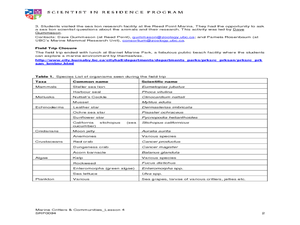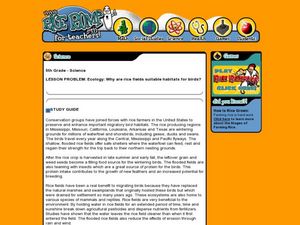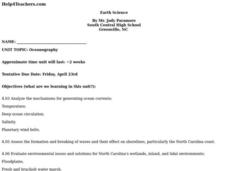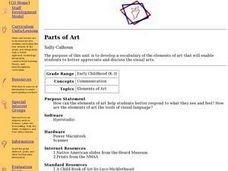Essential Energy
Being a Safety Star (Stage 3)
A spark of static electricity contains up to 3,000 volts, while a lightning strike contains around 3,000,000 volts. To understand electricity, its power, and the safety considerations relating to it learners engage in a comprehensive...
Agriculture in the Classroom
Roll of the Genes
Animal reproduction in sheep and cattle is explored with the help of Punnet squares. Scholars employ tools using probability to conclude the color of wool a sheep's offspring will have. Acting as animal geneticists, pupils then take...
Cloud Front
Weathering, Erosion, and Landforms—Student Activities
Tired of your students taking you for granite? Use a unit that offers multiple hands-on weathering and erosion labs and interactive activities. Some of the exciting lessons include planning a tour of Australia, using ice...
National Institute of Open Schooling
Water Pollution
Fifteen million children under the age of five die each year due to diseases in their drinking water. Water pollution is the topic of lesson 34 in the series of 36. Scholars, through reading and discussing, study numerous aspects of...
CK-12 Foundation
Bowling Alley
Sometimes it appears that a bowling ball slides down the alley rather than rolling, while other times it appears to switch rolling directions at some point. Scholars control the bowling ball size, initial rotation, initial speed, and...
CK-12 Foundation
Ski Jump
What are the three types of energy a ski jumper uses? If you said potential, kinetic, and heat, then you are correct. Scholars adjust the jumper's mass, jumper's form, and height of the start line in the simulation to display graphs of...
CK-12 Foundation
Diamond Cut
How do jewelers tell the difference between diamonds, glass, and cubic zirconia? A sparkling simulation demonstrates how to use a ray of light to determine the substance and ideal shape for a diamond. Scholars control the material,...
Purdue University
Design of a Green Roof
Help scholars develop a green thumb by building a green roof. Groups first grow lettuce seeds under normal conditions, then they try to grow the seeds in trays that are slanted by 45 degrees. They learn about tropism and engineering...
California State Parks
A Teaching Unit on Electricity
It's the invisible energy most people take for granted. Explore the properties of electricity in a complete three-week unit. Learners first manipulate circuits, then experiment with electromagnetism, and finally discover different...
NASA
The Big Climate Change Experiment Lesson 5: Climate Change Narratives
And now moving on to the next story. The last of five lessons in Unit 1: The Big Climate Change Experiment requires groups to create a script for a news segment on climate change. They either make a video of their story or conduct a live...
Curated OER
Marine Critters and Communities
Students touch, see, smell, and hear marine animals that live in a marina. In this marine animals lesson plan, students take field trip to a marine environment after studying the animals.
Curated OER
Customized Topographic Maps and Models
Students explore the information depicted on topographic maps. They construct a 3-D topographic map of a local area. They go on a field trip to the depicted area and compare the 'real world' with their models.
Curated OER
Environmental Hazards
Students identify environmental hazards on a simulated field trip. They analyze the exposure and suggest methods to eliminate or reduce exposure to toxic sources.
Curated OER
Habitats
First graders investigate animal habitats. In this habitats lesson, 1st graders visit the woods to identify examples of food, water, and shelter that animals use to survive. Students complete a worksheet.
Curated OER
Ecology: Why Are Rice Fields Suitable Habitats for Birds?
Fifth graders discover the uses for rice by reading about the habitats of certain birds. In this agriculture lesson, 5th graders research birds from the Gulf Coast and California and their reasons for living in rice fields....
Curated OER
Science Trail
Young scholars take a trip on a science trail to explore how corn and soybeans can be made into fuel. They make a list of byproducts that come from soybeans. Afterward, they participate in the activities related to the creation of...
Curated OER
Field Research Project: Comparing the Parent Rock Material of the San Francisco Terranes With Local Soil Types
Students investigate rocks and minerals and take a field trip to sample soils. They analyze rocks and soil, research the geological terrenes of the topology of San Francisco, and produce a lab research report.
Curated OER
Out and About: The History of Medicine
Students investigate the history of medicine. In this medicine instructional activity, students may visit the Thackray Medical Museum, the Old Operating Theatre, or the Edward Jenner Museum in Britain online or in-person to discover...
Curated OER
Bugs in the Woods
Second graders identify insects and plants in the forest ecosystem in a structured field trip with stations and activity booklets. In this bugs lesson, 2nd graders explore the ecosystem of the forest, complete the booklet and play...
Curated OER
Paleontology: A Field Experience
Young scholars go to a dig where they prospect for bones which simulate fossils. They encase the bones in plaster and transport them back to school for further investigation.
Curated OER
Earth Science
High schoolers analyze the mechanisms for generating ocean currents, temperature, and deep ocean circulation. They are able to assess the formation and breaking of waves and their effect on shorelines, particularly the North Carolina...
Curated OER
We Really Dig Archeology and Palentology
Sixth graders examine the differences between archeology and paleontology. Using the internet, they explore the tools and techniques used in each field. They must use the correct tools to uncover and record the objects they find. They...
Curated OER
Parts of Art
Young scholars define and use new vocabulary associated with the elements of art. As a class, they brainstorm different ways in which we communicate with one another. In groups, they view different pieces of art from the Native American...
Curated OER
Village Research
Sixth graders research global warming. In this science lesson, 6th graders collect data in the Waterton Townsite, Apgar Village and St. Mary area. Students interpret the data and form a hypothesis about global warming.























